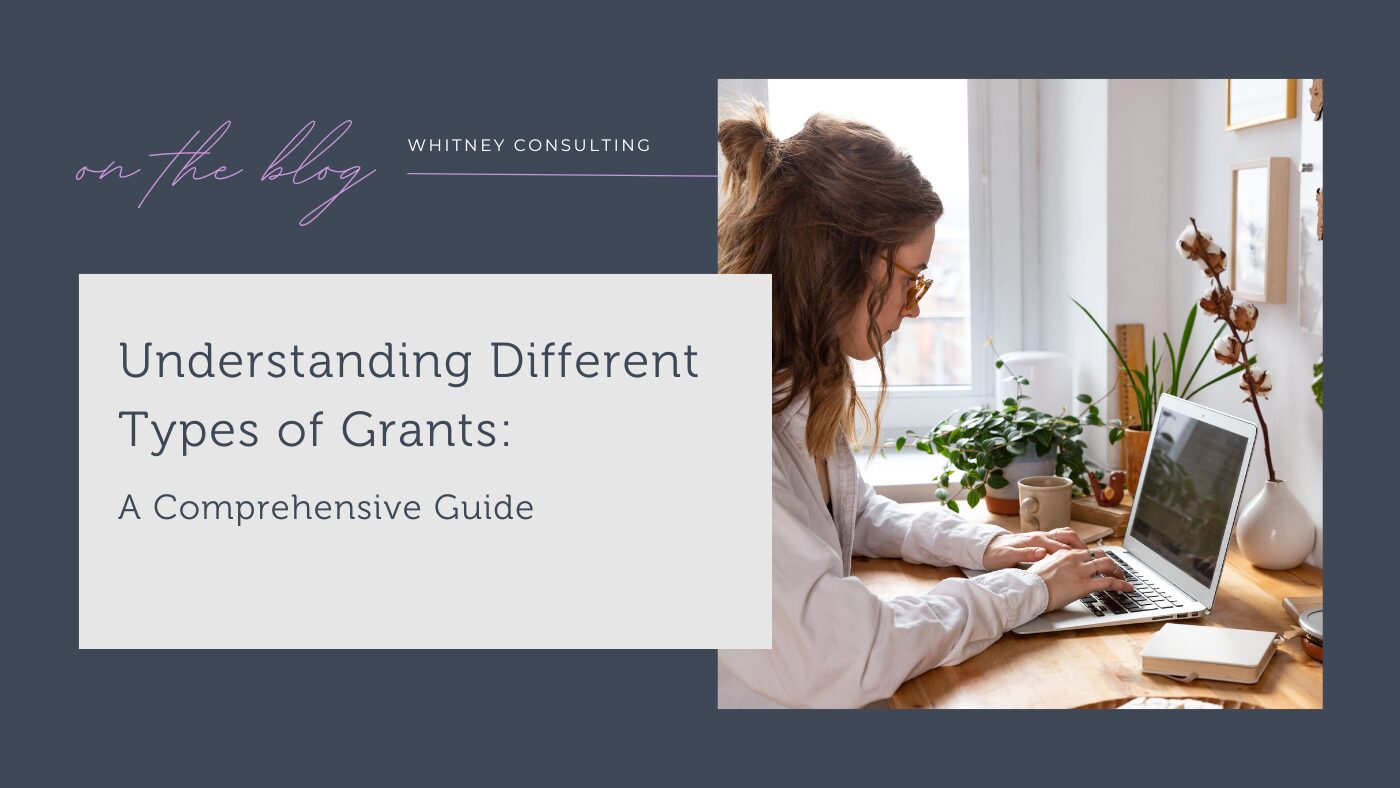Have you ever wondered how organisations secure funding for their projects without taking on debt? Grants are an essential resource for individuals, businesses, and nonprofits seeking financial support for a variety of purposes—from research and development to educational programs and community services. However, navigating the world of grants can be a complex and time-consuming process. With numerous grant opportunities available, understanding which grants are most suitable for your needs is crucial to securing funding.
For those new to the process or looking to maximise their chances of success, working with experienced grant writers in Perth can make all the difference. At Whitney Consulting, we specialise in identifying and applying for the right grants to help you achieve your goals. Whether you’re a startup, a nonprofit organisation, or an educational institution, our expert team is here to guide you through every step of the grant application journey.
In this guide, we’ll break down the different types of grants available and help you understand how to leverage them for your next project or initiative.
Read: Grant Writing is Simple!
Read: Grants – where do I start?
What Are Grants?
Defining Grants
At their core, grants are financial awards given to individuals, businesses, or organisations to support specific projects or activities. Unlike loans, grants do not require repayment, making them an attractive option for those in need of funding. Grants can come from a variety of sources, including governments, private foundations, corporations, and other entities. They are typically allocated for purposes that align with the funding body’s goals, such as advancing research, fostering community development, or promoting educational initiatives.
Grants vs. Loans
It’s important to differentiate between grants and loans, as both are common forms of financial support. While loans need to be repaid, usually with interest, grants are given without the expectation of repayment. This makes grants a crucial resource for those who may not have the capacity to take on additional debt. However, the application process for grants can be highly competitive and rigorous, as the funding body wants to ensure their investment aligns with their strategic objectives.
Why Are Grants Important?
Grants play a significant role in driving innovation, social change, and economic growth. They provide essential funding for initiatives that may not otherwise be able to secure financing through traditional means. For example, small businesses may use grants to support research and development of new products, while nonprofits can use them to fund community outreach programs. Education-focused grants, such as scholarships and fellowships, offer individuals the chance to pursue higher education or specialised training without the burden of tuition fees.
How Grants Work
When an organisation or individual applies for a grant, they are typically required to submit a proposal outlining how the funds will be used. The funding body then reviews the application to determine whether the project aligns with its priorities and whether the applicant is capable of successfully completing the project. Grant recipients must often report on the progress of their project and how the funds were spent, ensuring transparency and accountability.
Grant applications can vary widely depending on the type of grant, the funding body, and the sector involved. Some grants may require a detailed business case or research proposal, while others may focus more on demonstrating community impact or innovation potential.
Read: How Your Entity Type Affects Your Grant Eligibility
Read: Grant Jargon – Outputs, Outcomes and KPIs
Types of Grants
Grants come in many forms, each tailored to support specific needs or sectors. Whether you are a business, nonprofit, local government, or community organisation, there are different types of grants designed to meet your goals. Below, we break down the most common categories of grants to help you better understand your options.
a. Government Grants
Government grants are funds provided by local, state, or federal government agencies to support a wide range of initiatives. These grants are typically aimed at promoting public welfare, scientific advancement, economic growth, and social change. Government grants can be highly competitive, as many applicants vie for the limited funds available.
Some common examples of government grants include:
- Research Grants: These are designed to fund academic research, scientific projects, or technological innovation.
- Business Grants: Government grants are often available for small businesses, particularly those in industries like technology, manufacturing, and agriculture.
- Community and Development Grants: These grants support projects that aim to improve public infrastructure, community services, or social programs.
Given the competitive nature of government grants, a comprehensive and well-crafted application is essential. This is where professional grant writers can make a significant impact, ensuring your proposal aligns with the funding body’s priorities.
b. Private Sector Grants
Private sector grants are provided by private entities such as corporations, foundations, and philanthropic organisations. These grants often aim to support initiatives that align with the company’s corporate social responsibility (CSR) goals or the foundation’s mission. Unlike government grants, private sector grants are generally less stringent in terms of eligibility criteria, but they can be highly specific regarding the types of projects they fund.
Examples of private-sector grants include:
- Corporate Grants: Large corporations often offer grants to fund community development projects, environmental initiatives, or innovation in their industry.
- Foundation Grants: Many private foundations, such as the Bill & Melinda Gates Foundation or the Ford Foundation, fund social impact projects in areas like healthcare, education, and poverty alleviation.
Private sector grants are often more flexible than government grants, but they may require a more tailored approach to the application process.
c. Research and Development Grants
Research and development (R&D) grants are awarded to fund projects that focus on scientific, technological, or medical advancements. These grants are crucial for businesses or individuals working on groundbreaking projects that require financial support to move from concept to reality. R&D grants are typically offered by both government agencies and private entities that are looking to advance specific industries.
Examples of R&D grants include:
- Technology and Innovation Grants: These grants fund projects that aim to create new products, processes, or technologies.
- Medical Research Grants: Health-focused organisations often offer R&D grants to support research in fields such as disease prevention, treatment, and cure development.
Securing an R&D grant can be highly competitive, as these projects often promise long-term and significant returns on investment. Therefore, a strong proposal and clear demonstration of the potential impact of the research are critical for success.
d. Education Grants
Education grants provide funding for individuals and institutions focused on advancing learning, research, and professional development. These grants are commonly used for scholarships, fellowships, and educational programs aimed at expanding access to knowledge and skills development. Education grants can be offered by governments, universities, corporations, and nonprofit organisations.
Examples of education grants include:
- Scholarships and Fellowships: These are typically awarded to students or professionals seeking financial assistance to pursue academic degrees or specialised training.
- Training and Development Grants: These grants support organisations or institutions offering education and training in fields such as healthcare, vocational skills, and the arts.
Education grants play a vital role in helping individuals pursue their academic goals or career development without the burden of tuition fees or training costs.
e. Nonprofit Grants
Nonprofit grants are aimed at supporting charitable organisations and their missions to address social, cultural, environmental, and humanitarian issues. These grants are often awarded by both government and private sectors and can help fund a variety of programs ranging from community outreach and advocacy to healthcare, disaster relief, and environmental protection.
Examples of nonprofit grants include:
- Community Development Grants: These grants fund projects that aim to improve the quality of life in local communities, such as building affordable housing, creating job training programs, or enhancing public spaces.
- Environmental Grants: Environmental nonprofits often apply for grants to fund conservation efforts, sustainability projects, or climate change initiatives.
Nonprofit grants are highly competitive, as many organisations are vying for limited resources. A strong proposal that clearly demonstrates the project’s potential impact can significantly increase the chances of securing funding.
Read: Grant Criteria Explained
Read: Tips for Grant Acquittals
Key Considerations When Applying for Grants
Securing a grant is not a simple process; it requires careful planning, a clear understanding of the requirements, and a well-crafted proposal. To increase your chances of success, there are several important factors to consider when applying for grants. Below are key considerations to keep in mind throughout the application process.
Understand the Eligibility Criteria
Before starting the application process, it’s crucial to thoroughly review the eligibility requirements for the grant you’re interested in. Each grant program will have specific criteria, such as:
- The type of organisation or individual eligible to apply (e.g., nonprofit organisations, small businesses, researchers).
- The geographic location requirements (e.g., certain grants may only be available to applicants in specific regions or countries).
- The specific project or initiative that the grant is intended to fund (e.g., technology development, community outreach, or environmental conservation).
By ensuring that you meet the eligibility criteria, you’ll avoid wasting time on grants that you cannot apply for. This step is essential to narrow down your options and focus your efforts on the most relevant opportunities.
Research the Grant Provider’s Goals
Each grant provider has specific goals and priorities that align with their funding strategy. It’s essential to understand these objectives before submitting your application. Whether the funding body is a government agency, private corporation, or foundation, they will want to see that your project aligns with their mission.
For example, a grant for environmental conservation will be more interested in projects focused on sustainability, biodiversity, or climate change, while a business development grant might prioritise projects that support economic growth, jobs creation or technological innovation. Tailor your proposal to clearly demonstrate how your project helps the funding body achieve its goals. This is where working with experienced grant writing consultants can be beneficial, as they can help craft proposals that resonate with the grant provider’s mission.
Prepare a Detailed and Realistic Budget
A comprehensive and realistic budget is one of the most critical components of any grant application. Grant providers want to see that you have a clear plan for how the funds will be used and that your project is financially feasible. This budget should include:
- Direct costs: These are expenses directly related to delivering the project, such as salaries, equipment, and materials.
- Contingency funds: It’s important to allocate a portion of the budget for unforeseen expenses or potential cost overruns.
A well-structured budget helps demonstrate that you’ve thought through the financial aspects of your project and can manage the funds responsibly. Be realistic in your estimates and provide sufficient detail to support your request for funding.
Develop a Clear and Compelling Project Proposal
Your project proposal is the heart of your grant application. It’s where you explain your project’s goals, objectives, timeline, and expected outcomes. A strong proposal should:
- Clearly define the problem: Describe the issue or need your project aims to address.
- Propose a solution: Explain how your project will resolve the issue or meet the identified need.
- Set measurable goals: Define the outcomes you expect from your project, ensuring they are specific, measurable, attainable, relevant, and time-bound (SMART).
- Outline a timeline: Provide a realistic timeline for project implementation, including milestones and deadlines.
A well-written proposal not only demonstrates the viability of your project but also shows that you have the necessary skills and expertise to implement it successfully.
Meet All Application Deadlines and Requirements
Many grant programs have strict application deadlines and detailed submission requirements. It’s important to ensure that you submit your application on time and include all the necessary documents and information. Missing deadlines or failing to meet application requirements could result in your proposal being disqualified, regardless of its quality.
Double-check the application instructions to make sure you’re submitting all required materials, such as:
- Personal or organizational information
- Financial statements or tax documents
- Letters of support or references
- Project plans or evaluation frameworks
Create a checklist to help you stay organised and ensure you’ve included everything required before submission.
Prepare for Reporting and Accountability
Grant providers often require progress reports and financial documentation to ensure that the funds are being used appropriately and that the project is advancing as planned. Before applying for a grant, it’s important to be prepared for these reporting requirements. Ensure you have systems in place to track how funds are spent and the progress of your project.
Being able to provide detailed reports not only helps maintain transparency but also positions you as a responsible and credible grantee, which can improve your chances of securing future funding.
Read: From Good to Exceptional – elevating your grant application
Read: Grant Writing Myths Debunked
How Whitney Consulting Can Help You Secure Funding
Navigating the grant application process can be daunting, especially for those who are unfamiliar with the complexities of writing a successful proposal. Whether you’re applying for a government grant, a research and development fund, or a private sector sponsorship, Whitney Consulting is here to make the process easier and more efficient. Below, we outline how our team of experts can help you secure the funding you need to bring your project or initiative to life.
a. Expert Knowledge and Guidance
At Whitney Consulting, we specialise in helping clients identify the most relevant and lucrative grant opportunities. Our team’s deep understanding of the grant landscape ensures that we can guide you toward funding sources that align with your project’s goals. We don’t just focus on the application process—we help you make informed decisions about which grants are the best fit for your needs. This tailored approach saves you time and maximises your chances of success.
b. Crafting Tailored and Compelling Proposals
One of the most critical elements of securing a grant is presenting a compelling and clear proposal. Our professional team excels at crafting proposals that effectively communicate your project’s objectives, outcomes, and alignment with the funding body’s goals. We work closely with you to develop a detailed, well-researched proposal that outlines your project’s significance and demonstrates its potential impact.
Whether you’re a small business, nonprofit or community organisation, or local government, we ensure that your proposal speaks directly to the funder’s priorities, increasing your chances of being awarded the grant.
c. Maximizing Your Chances of Success
The grant application process is competitive, and having a skilled partner can make a significant difference. At Whitney Consulting, we have a proven track record of helping our clients secure funding for a wide range of projects. Our expertise in writing successful grant proposals, combined with our in-depth knowledge of various funding sources, gives you a competitive edge in a crowded field.
Our services can include:
- Conducting thorough research on available grants
- Writing and editing your proposal to meet the specific requirements
- Reviewing your application for completeness and accuracy
- Ensuring that all documentation and deadlines are met
By leveraging our expertise, you can feel confident that your application is in the best possible hands.
d. Comprehensive Support Throughout the Process
At Whitney Consulting, we provide ongoing support at every stage of the grant application process. From the initial research phase to submitting your final proposal, we are with you every step of the way. Even after your grant application is submitted, we can assist with follow-up communications and reporting, ensuring that your grant proposal is well-received and your project stays on track.
In the case of a successful application, we can help you manage the reporting and compliance requirements associated with your grant, allowing you to focus on the execution of your project.
e. Grant Writing Service in Perth
As a trusted grant writing service in Perth and regional WA, Whitney Consulting offers local expertise and personalised support for individuals and organisations in Western Australia. Whether you’re based in Perth or in the regions, we understand the specific funding opportunities available to you and can tailor our approach to meet your needs. Our team’s local knowledge and experience ensure that you are applying for grants that are relevant to your region and project.
Read: What are Grant Guidelines?
Read: Top Grant Writing Tips
Unlock Your Funding Potential: Ready to Apply for a Grant?
Are you ready to take the next step toward securing funding for your project?
Understanding the different types of grants available and the key considerations when applying can make all the difference in your success. Whether you’re a business, nonprofit, or local government, identifying the right grant and crafting a compelling proposal is essential for achieving your goals.
At Whitney Consulting, our expert team is dedicated to helping you navigate the complex world of grant applications. With tailored support, strategic advice, and in-depth knowledge of funding opportunities, we ensure your project stands out. Contact us today to learn how we can help you secure the funding you need to bring your ideas to life.






